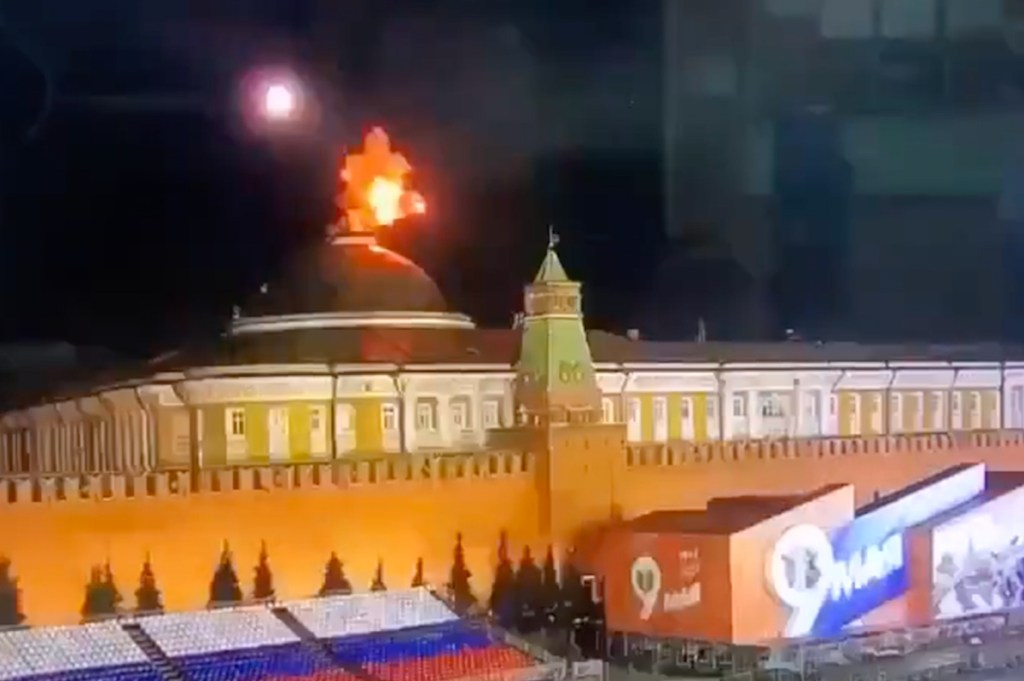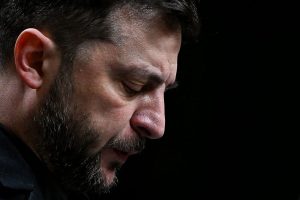The Russian government has claimed that “two unmanned aerial vehicles were aimed at the Kremlin. As a result of timely actions taken by the military and special services with the use of radar warfare systems, the vehicles were put out of action.” There were, it continues, “no victims and material damage,” although it is considering it a “terrorist” attempt to kill Putin. That said, unverified videos circulating on social media (which, of course, is not necessarily proof in the age of deep fakery), shows at least one drone hitting the Senate Building, one of the larger structures inside the Kremlin complex, starting a small fire.
Ukraine has been developing longer-range drones and getting closer to Moscow. In February, one was reportedly found near the town of Kolomna, approximately sixty miles southeast of the city, and last month one crashed about twenty miles to Moscow’s east. Nonetheless, to manage to reach what is meant to be one of the most heavily-defended cities in the world and hit the government’s very heart would demonstrate audacity, luck and capability.
After all, drones are generally slow and vulnerable weapons, and Moscow is ringed by radar systems and air defense missiles. Furthermore, the Kremlin is notoriously protected by a GPS spoofing system that is the bane of drivers in the heart of the city, that tends to tell them that they are at Vnukovo airport, some fifteen miles to the southwest. As a last-ditch defense, the Kremlin Guard of the Federal Protection Service have anti-drone rifles which ought to interfere with their command signals. This should rule out any freelance attacks by disgruntled amateurs within Russia.
If this was a Ukrainian attack, which would probably have been masterminded by military intelligence, then it was primarily symbolic and political. It is hardly that they would have expected to kill Putin given the relatively small warheads on the drones and, more to the point, that he is notorious these days for only rarely and reluctantly going to the Kremlin. Indeed, he was at his out-of-town residence at Novo-Ogoryovo.
What the Ukrainians would have wanted to show is that Moscow is not safe, and to do so shortly before May 9: Victory Day in the Russian canon. Already many Victory Day events have been canceled or scaled back because of security concerns.
Of course, an attack has serious risks. The Kremlin has said it “reserves the right to take retaliatory measures where and when it sees fit,” and while one might think they are already doing their worst in Ukraine, it could be an excuse for further escalation. (It may well also anger Washington, which for months has been trying to warn Kyiv off any such attacks.)
For that matter, some are already suggesting that this was a “false flag” exercise staged by Putin to anger the Russian people and provide an excuse for further barbarities. Mykhaylo Podolyak, one of Volodymyr Zelensky’s advisors, claimed Kyiv had nothing to do with it, but that it signaled some impending Russian atrocity. However, Kyiv’s explanation is not especially plausible. Russia would be admitting to a shocking breach of security. It would be on a par with the infamous case in 1987 when a young German called Mathias Rust landed his light plane on the Bolshoi Moskvoretsky Bridge, right next to the Kremlin. Rust was on a quixotic mission of peace, but his exploit led to a purge of the high command, including the defense minister and the commander of the air defense forces.
It may be that this will lead to the dismissal of defense minister Sergei Shoigu (who may breathe a sigh of relief). It is hard to believe that Putin is so desperate for political capital that he would be willing to pretend that his own air defense forces cannot stop drones from traveling the 270-plus miles from the Ukrainian border and hitting the symbolic heart of the Russian state.
Most likely, this is just what it seems: that Kyiv, witnessing the continued attacks on its infrastructure, houses and hospitals, feels it has no reason to pull its punches. So far, this is all speculative, but the odds are that this will only make even that majority of Russians who were unenthused about the war angry — as one commentator said, this could be “Zelensky’s gift to Putin.”
This article was originally published on The Spectator’s UK website.

























